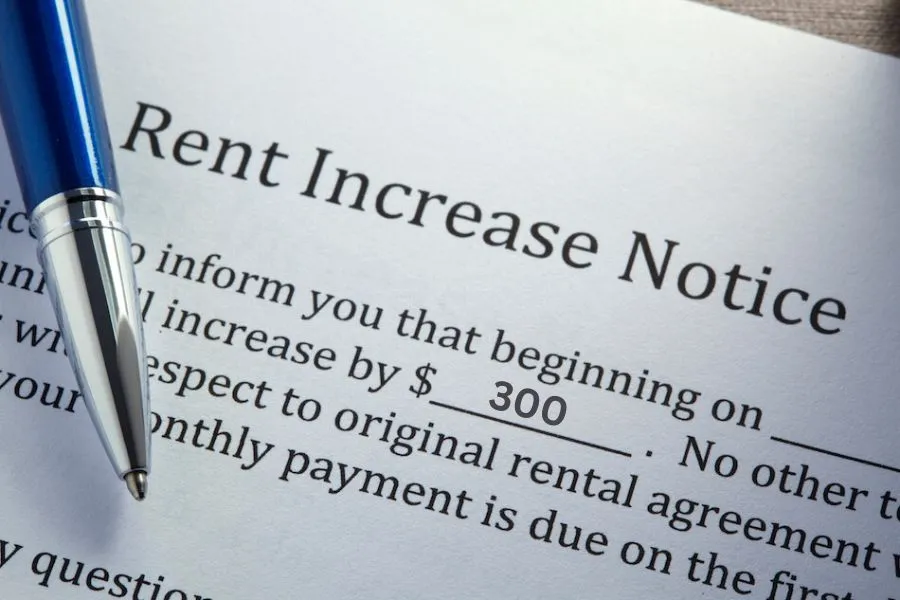Can My Landlord Raise My Rent $300? Is It Legal In 2024?
Are you a tenant feeling uncertain about the possibility of a $300 rent increase? It’s a common concern.
In this guide, we’ll demystify the legal aspects and provide you with the insights you need to navigate this situation confidently.

Can My Landlord Raise My Rent by $300?
Landlords have the authority to increase the rent by up to $300, provided it aligns with local laws and regulations. This hike can be justified if the current rent is considerably lower than the prevailing market rates or if there’s a need to offset higher operational expenses and property enhancements.
Understanding Rent Control and Rent Stabilization
Some cities and states have implemented rent control or rent stabilization measures to protect tenants from exorbitant rent increases.
These regulations typically impose limits on the amount and frequency of rent hikes.
If you live in an area with rent control or rent stabilization laws, your landlord may be subject to these restrictions, and a $300 increase could be beyond the allowable limit.
To determine whether your location has rent control or rent stabilization, you can consult local housing authorities, tenant organizations, or legal professionals who specialize in rental laws.
They can provide you with specific information about the rules that apply in your area.
Reviewing Your Lease Agreement
One of the first steps you should take is to carefully review your lease agreement.
Lease agreements often include provisions regarding rent increases, specifying the notice period and the maximum percentage or dollar amount by which the rent can be raised.
Look for a section in your lease agreement that outlines the terms and conditions related to rent increases.
It should detail the procedures your landlord must follow, the notice period they need to provide, and any limitations on the amount of the increase.
If your lease agreement does not address rent increases, the laws of your jurisdiction will usually govern the process.
State-Specific Laws on Rent Increases
Rent increase regulations can vary from state to state. Some jurisdictions have specific laws that govern how much and how often landlords can raise the rent.

These laws may require landlords to provide a minimum notice period before implementing a rent increase.
To find accurate and up-to-date information regarding rent increase laws in your state, you can consult state housing departments, tenant rights organizations, or legal professionals who specialize in landlord-tenant law.
They can guide you through the specific regulations that apply to your situation.
Communicating with Your Landlord
If you receive notice of a proposed rent increase, it’s crucial to engage in open communication with your landlord.
You can express your concerns, discuss the reasons behind the increase, and explore possible alternatives.
During these conversations, you can inquire about the factors contributing to the rent increase, such as rising property taxes, increased maintenance costs, or renovations.
Understanding the reasoning behind the increase can help you negotiate a mutually acceptable solution.
While your landlord has the right to raise the rent, they may be willing to consider a smaller increase or a phased approach.
By demonstrating your commitment as a reliable and responsible tenant, you may be able to find common ground.
Factors That May Influence Rent Increases

Rent increases are influenced by various factors, and understanding these elements can provide valuable insight into your landlord’s decision-making process.
Here are some factors that may influence rent increases:
Local Rental Market Conditions
The state of the local rental market can significantly impact rent increases.
If there is high demand and a low supply of rental properties in your area, landlords may have more leeway to raise rents.
Conversely, in a market with excess supply and low demand, landlords may be less inclined to increase rents significantly.
Property Expenses and Maintenance Costs
Landlords face various expenses related to property ownership, including property taxes, insurance, maintenance, repairs, and utility costs.
If these expenses increase over time, it can put pressure on landlords to raise rents to cover their costs effectively.
Landlord’s Financial Goals
Landlords may have specific financial goals, such as generating a certain level of income or maintaining a certain return on investment (ROI) for their properties.
If their expenses rise or if they perceive an opportunity for increased rental income, they may choose to raise rents accordingly.
Local Laws and Regulations
Local laws and regulations can also influence rent increases. Some areas may have limitations on the amount and frequency of rent hikes, while others may allow more flexibility.
It’s important to be aware of the specific rules in your jurisdiction to understand the boundaries within which your landlord must operate.
Negotiating a Mutually Agreed-Upon Rent Increase
In some cases, you may be able to negotiate a rent increase that is more manageable for you.
By engaging in open and respectful dialogue with your landlord, you can discuss your financial situation, present any relevant information or circumstances, and propose an alternative rent increase that aligns with your budget.
Remember, negotiation requires cooperation and compromise from both parties.
By showing your willingness to find a solution that works for both you and your landlord, you increase the chances of reaching a mutually agreed-upon outcome.
Consequences of Not Paying the Increased Rent
If you decide not to pay the increased rent, it’s important to understand the potential consequences that may follow. Here are some possible outcomes:
Eviction Proceedings
When you fail to pay your rent as required by your lease agreement, your landlord may initiate eviction proceedings.
This legal process allows them to seek the unpaid rent and, in severe cases, terminate your tenancy.
Eviction proceedings can be a lengthy and costly process for both parties involved.
To avoid eviction, it’s crucial to communicate with your landlord and address any difficulties you may have in paying the increased rent.
Exploring alternative solutions or discussing your financial situation openly can sometimes help in finding a resolution.
Damage to Your Rental History
Non-payment of rent can have a detrimental impact on your rental history.
Rental history is a record of your payment behaviour and overall conduct as a tenant. Landlords often consider this information when reviewing rental applications.
Negative entries on your rental history can make it challenging to secure future rental properties.
Landlords prefer tenants who have a track record of timely rent payments and responsible tenancy.
By not paying the increased rent, you risk damaging your rental history and facing difficulties when searching for new housing opportunities.
Legal Disputes and Expenses
Choosing not to pay the increased rent may lead to legal disputes between you and your landlord.
In such cases, either party may decide to pursue legal action to resolve the issue.
Legal proceedings can be time-consuming, stressful, and expensive.
They may involve hiring legal representation, attending court hearings, and presenting evidence to support your case.
Engaging in a legal dispute should be a last resort, as it often results in additional financial burden and emotional strain.
Strained Relationship with Your Landlord
Refusing to pay the increased rent can strain your relationship with your landlord.
A strained relationship can create an uncomfortable living situation and potentially lead to further conflicts.
Maintaining a positive and respectful relationship with your landlord is generally beneficial for both parties.
Open and honest communication can help address concerns, negotiate solutions, and maintain a harmonious living environment.
If you choose not to pay the increased rent, it may create tension and strain the relationship with your landlord.
To prevent these consequences, it’s essential to address the rent increase issue proactively.
Communicate with your landlord, express any concerns you may have, and explore possible alternatives.
Seeking a resolution through open dialogue can help you avoid the negative consequences associated with not paying the increased rent.
How to Address a Rent Increase
If your landlord notifies you of a rent increase, you can take the following steps to address the situation effectively:
Step 1: Review Your Lease Agreement
Begin by carefully reviewing your lease agreement. Pay close attention to the terms and conditions related to rent increases.
Look for clauses that specify the notice period, the maximum percentage or dollar amount by which the rent can be raised, and any other relevant provisions.
Understanding your rights and obligations outlined in the lease agreement will help you navigate the situation more confidently.
Step 2: Research Local Rent Increase Laws
Next, familiarize yourself with the rent increase laws and regulations in your jurisdiction.
Each state or locality may have specific rules governing rent increases, such as the maximum allowable percentage increase and the notice period required.
You can consult resources provided by local housing authorities, tenant rights organizations, or legal professionals who specialize in landlord-tenant law.
Being aware of the applicable laws will empower you to ensure that your landlord is following the proper procedures.
Step 3: Communicate with Your Landlord
Engage in open and respectful communication with your landlord regarding the rent increase.
Initiate a conversation to discuss the proposed increase and any concerns or questions you may have.
Express your willingness to find a mutually acceptable solution. During this discussion, you can inquire about the reasons behind the increase, such as rising costs or market conditions.
Keep in mind that maintaining a positive and respectful relationship with your landlord can lead to a more productive dialogue.
Step 4: Research Market Rental Rates
Conduct research on the rental rates for similar properties in your area.
This will provide you with a benchmark to determine whether the proposed rent increase aligns with the market value.
Look for rental listings, consult real estate websites, or even speak with local real estate agents to gather information on current rental prices.
Armed with this knowledge, you can present your case more effectively during discussions with your landlord.
Step 5: Explore Alternatives
If the proposed rent increase is unaffordable for you, consider exploring alternatives with your landlord.
Instead of outright rejecting the increase, propose alternative options that could be more manageable for your budget.
You may suggest a smaller increase, request additional amenities or services to be included in the rent, or propose other concessions that could help offset the higher cost.
By offering alternative solutions, you demonstrate your willingness to find a compromise that benefits both parties.
Step 6: Seek Legal Advice
If you believe that your landlord’s rent increase violates local laws or if you encounter difficulties in resolving the issue through communication, it may be necessary to seek legal advice.
Consult with a legal professional who specializes in landlord-tenant law to understand your rights and options.
They can provide guidance based on the specific laws and regulations in your jurisdiction and help you navigate any potential legal complexities.
FAQs About 300 Dollars Rent Increases
Can my landlord raise my rent without notice?
No, in most jurisdictions, landlords are required to provide notice before implementing a rent increase. The notice period and requirements may vary depending on local laws and the terms of your lease agreement.
Can my landlord raise my rent during the lease term?
In most cases, landlords cannot raise the rent during the lease term unless there is a specific provision in the lease agreement that allows for mid-term increases.
Can I refuse to pay a rent increase?
While you have the right to negotiate or discuss a rent increase with your landlord, refusing to pay the increased rent without a valid reason can lead to legal consequences, such as eviction proceedings.
Can my landlord raise the rent by any amount?
Landlords generally have the discretion to set the rent amount, but local laws and regulations may impose limitations on the maximum allowable rent increase. It’s essential to familiarize yourself with the rent increase laws in your area.
Can I terminate my lease if my landlord raises the rent?
If your landlord raises the rent and it becomes unaffordable for you, you may choose to terminate your lease, provided you comply with the notice requirements outlined in your lease agreement or local laws.
Can my landlord raise my rent $300 NYC?
In New York City, there’s no specific limit, but landlords must provide advanced written notice for increases of 5% or more. This rule applies to month-to-month tenants without a lease.
Can my landlord raise my rent $300 in Virginia?
In Virginia, rent increases depend on your lease terms, as there are no statewide rent control laws. If it aligns with the lease and isn’t discriminatory, it’s typically allowed. Always check your lease and local regulations for details.
Final Thoughts
Whether your landlord can raise your rent by $300 depends on various factors such as local laws, lease agreements, and negotiations.
It’s essential to review your lease, understand local regulations, communicate with your landlord, and seek legal advice if needed.
Being informed and proactive can help you navigate rent increase situations effectively.